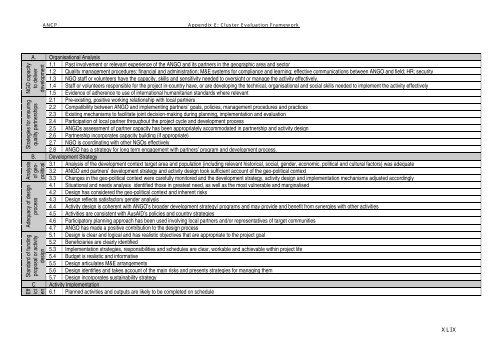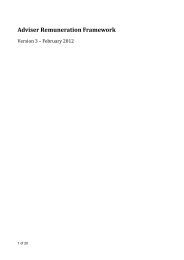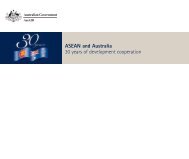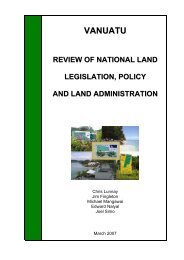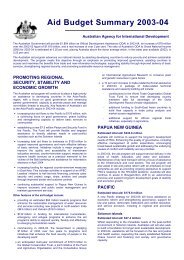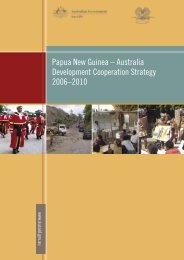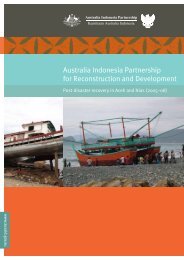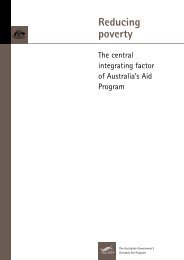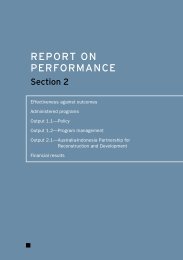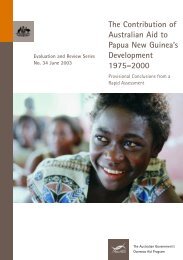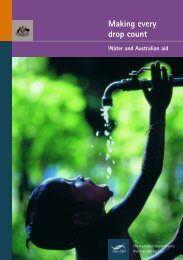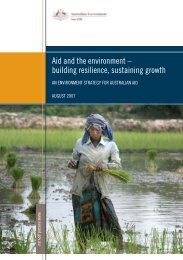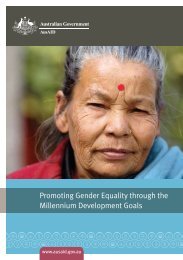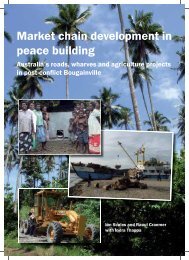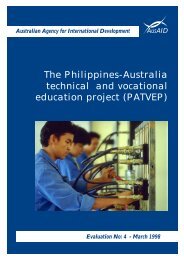ANCP Philippines Cluster Evaluation Report - AusAID
ANCP Philippines Cluster Evaluation Report - AusAID
ANCP Philippines Cluster Evaluation Report - AusAID
Create successful ePaper yourself
Turn your PDF publications into a flip-book with our unique Google optimized e-Paper software.
<strong>ANCP</strong> Appendix E: <strong>Cluster</strong> <strong>Evaluation</strong> FrameworkA. Organisational Analysis1.1 Past involvement or relevant experience of the ANGO and its partners in the geographic area and sector1.2 Quality management procedures: financial and administration; M&E systems for compliance and learning; effective communications between ANGO and field; HR; security1.3 NGO staff or volunteers have the capacity, skills and sensitivity needed to oversight or manage the activity effectively.NGO capacityto deliverdevelopmentStrategies for ensuringquality partnerships1.4 Staff or volunteers responsible for the project in-country have, or are developing the technical, organisational and social skills needed to implement the activity effectively1.5 Evidence of adherence to use of international humanitarian standards where relevant2.1 Pre-existing, positive working relationship with local partners2.2 Compatibility between ANGO and implementing partners’ goals, policies, management procedures and practices2.3 Existing mechanisms to facilitate joint decision-making during planning, implementation and evaluation2.4 Participation of local partner throughout the project cycle and development process2.5 ANGOs assessment of partner capacity has been appropriately accommodated in partnership and activity design2.6 Partnership incorporates capacity building (if appropriate)2.7 NGO is coordinating with other NGOs effectively2.8 ANGO has a strategy for long term engagement with partners’ program and development process.B. Development Strategy3.1 Analysis of the development context target area and population (including relevant historical, social, gender, economic, political and cultural factors) was adequate3.2 ANGO and partners’ development strategy and activity design took sufficient account of the geo-political contextAnalysisof geopoliticalAdequacy of designprocessStandard of fundingproposal or activitydesignCEfficien3.3 Changes in the geo-political context were carefully monitored and the development strategy, activity design and implementation mechanisms adjusted accordingly4.1 Situational and needs analysis identified those in greatest need, as well as the most vulnerable and marginalised4.2 Design has considered the geo-political context and inherent risks4.3 Design reflects satisfactory gender analysis4.4 Activity design is coherent with ANGO’s broader development strategy/ programs and may provide and benefit from synergies with other activities4.5 Activities are consistent with <strong>AusAID</strong>’s policies and country strategies4.6 Participatory planning approach has been used involving local partners and/or representatives of target communities4.7 ANGO has made a positive contribution to the design process5.1 Design is clear and logical and has realistic objectives that are appropriate to the project goal5.2 Beneficiaries are clearly identified5.3 Implementation strategies, responsibilities and schedules are clear, workable and achievable within project life5.4 Budget is realistic and informative5.5 Design articulates M&E arrangements5.6 Design identifies and takes account of the main risks and presents strategies for managing them5.7 Design incorporates sustainability strategyActivity Implementation6.1 Planned activities and outputs are likely to be completed on schedule<strong>ANCP</strong> <strong>Philippines</strong> <strong>Cluster</strong> <strong>Evaluation</strong> <strong>Report</strong> (ver. 2.0)XLIX


